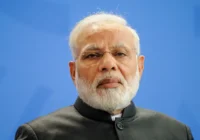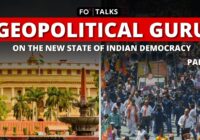As congratulatory messages for Modi pour in from all parts of the world, it is important to remember that the journey doesn’t end at victory.
Narendra Modi, the god-like leader of the Bharatiya Janata Party (BJP), appears to have won another landslide victory. Predicted to secure at least 300 of the 543 seats (347 with if you count its National Democratic Alliance, NDA, partners) in the lower house of India’s Parliament, the Lok Sabha, Modi has decimated the opposition. With Rahul Gandhi’s Congress party conceding defeat, the prime minister has inscribed himself in the collective conscience of more than a billion Indians. No leader has had such a magnetic effect on the country’s electorate since Atal Behari Vajpayee, another BJP leader, in the late 1990s.
Assisted by his influential party president, Amit Shah, and some strategic victories — including one in the opposition party’s stronghold of Amethi, in Uttar Pradesh — Modi has proved that winning an election is possible despite espousing religious hatred and bigotry, and shutting down dissent. It is now probably safe to say that India is colored in saffron — the color of right-wing Hindu nationalists. Modi, who is the first prime minister to return to power with such a large mandate in five decades, is here to stay.
There have been significant success for the NDA in the past five years. Under Modi, India has emerged as one of the world’s fastest growing economies and has taken a strong stance against terrorism. The government has also managed to avert a humanitarian catastrophe by evacuating over a million people within 24 hours in the state of Odisha before a devastating cyclone hit.
As India gears up for another round of BJP-led NDA rule and the possibility of a war with Pakistan, the future seems difficult to predict. As prime minister, Modi has continually maintained that economic reforms and job creation are his biggest goals, but statistics — which were duly suppressed by the government a few months back — show otherwise. The Indian economy has been weakened by the disastrous demonetization policy almost three years ago. Unemployment is at its highest in 45 years. Minorities continue to remain concerned about their future in a country that is relying on division along religious lines to further political agendas. There is a lot to fear for in the future, and no one around to disperse that fear.
At the Expense of the Opposition
As congratulatory messages for Modi pour in from all parts of the world, and India prepares to be part of a world order that is dangerously veering towards the right, it is important to remember that the journey doesn’t end at victory. The NDA government has tall promises to live up to and has to steer away from impulsive decisions made by the prime minister if it wants to survive in a nation that has pinned its hopes on the alliance at the expense of the opposition.
Rahul Gandhi failed to garner public appreciation, despite much fanfare surrounding his becoming the leader of the Congress party. The son of former Prime Minister Rajiv Gandhi was seen by his mother and some politicians within Congress as the torch bearer for a new generation. But as candidate, he failed to live up to expectations and ended up making a mockery of himself through terribly poor PR. Despite promising India policies such as the ambitious Nyuntam Aay Yojana, which pledged to provide 72,000 rupees ($1,000) to the poorest 20% of the country, Gandhi failed to garner public interest, even in his home constituency of Amethi, where Congress last lost in 1998.
Despite gracefully accepting defeat by the NDA alliance, Gandhi has a tough road ahead. He has reportedly offered to resign as party president, and his political future looks bleak. Congress has always found it hard to survive without the Nehru-Gandhi family, which has held the party together since India won its independence in 1947. In the words of Ibn Khaldun, an Arab historian, dynasties become decadent by the time they reach the fifth generation. Rahul Gandhi, who is the fifth generation of the Nehru-Gandhi family, is showing signs of fatigue. He now needs to hand over to someone who has a better public image and is more adept at dealing with India’s political quagmire.
Congress desperately needs an image makeover, and no Gandhi scion, even the sister of Rahul Gandhi, Priyanka Gandhi Vadra, can make that change happen. As candidate, Gandhi was utterly lost, not just at the national forum, but on the ground as well. In this election, he lost Amethi owing to pure neglect. While he heaped accusations on the BJP-led NDA and explored alliances with smaller political parties, the BJP’s Smriti Irani swiftly laid out her base in Amethi and eventually won the contest there.
Don’t Just Make Promises
Narendra Modi is facing immense responsibilities in the coming five years, the most important of which is maintaining a friendly alliance with neighboring countries, particularly Pakistan. Supporters of the BJP are asking for an open boycott of Pakistan on social media and are requesting India exclude Pakistan from Modi’s swearing-in ceremony. The strategic release of a movie about a surgical strike conducted under Modi’s aegis, along with a terrorist attack in Kashmir that killed at least 40 Indian paramilitary troopers shortly before the elections began, gave the prime minister the upper hand in advocating his anti-Pakistan agenda.
Giving into demands for an open boycott of Pakistan will have major ramifications for India’s defense and public safety. Playing the Hindu religion card to antagonize Muslim-majority Pakistan will incite religious violence in India and can open up its borders to more terrorism. A war with Pakistan can be disastrous for India, particularly because New Delhi doesn’t have the defense structure in place nor the funds to survive a war, even if it does manage to generate significant political will.
Modi’s promise of “acche din” (good days) will be heavily scrutinized over the next five years, both by the public and the media. Despite much hype, the government’s flagship Make in India program failed to take off, while the attempt to get rid the country of black money fell flat, crashing the job market ad crushing lives instead. The benefits from the highly anticipated Goods and Services Tax, which was implemented haphazardly, are yet to reflect on the economy.
The successes of the last five years, such as India’s improvement in the Ease of Doing Business ranking and the financial inclusion program, Pradhan Mantri Jan Dhan Yojana, will be expected to be replicated. But the announcement of more economic schemes needs to come with a conscience that development is for every Indian, irrespective of religion or caste. A major development that remains to be seen is the verdict on the construction of a temple for Lord Ram on the ruins of the Babri Masjid, a 16th-century mosque that was demolished by right-wing Hindu nationalists in December 1992. Calls for “mandir banega” (the temple will be built) are spreading all over Indian social media, making the issue even more dangerous and contentious than it already is.
First Things First
The first thing the re-elected prime minister needs to do is make it clear that he is here for all Indians and not representative of the religious majority. He should be open to criticism and urge his party’s politicians to accept healthy debate instead of shutting down those who disagree with the government. Reducing funding for humanities research, beating up students at a national university and tolerating the murders of liberal thinkers and journalists is a sign of damaged democracy.
Prime Minister Modi also has a tiresome responsibility of creating more jobs in the manufacturing sector and protecting agriculture, which is the backbone of India’s economy. He has already set a bad example in terms of governance by strong-arming the Reserve Bank of India and forcing its governor to step down after the bank asserted its autonomy by questioning the government’s decision to waiver millions of bad loans from decaying state-owned banks. Under the NDA government, public banks have lent to financial criminals and tried tirelessly to bail out failing companies such as Jet Airways, which is near bankruptcy. This needs to immediately stop if India doesn’t want its economy to suffer a credit shock.
The road ahead for the BJP is a thorny one. Whether Narendra Modi decides to walk on these thorns by accepting their existence or steamrolls over them is a decision only he — and his soon-to-be appointed cabinet — can make.
*[An earlier version of this article made a connection between the air strike ordered by Prime Minister Modi and the terrorist attack in Kashmir; they were, however, unrelated incidents.]
The views expressed in this article are the author’s own and do not necessarily reflect Fair Observer’s editorial policy.
Support Fair Observer
We rely on your support for our independence, diversity and quality.
For more than 10 years, Fair Observer has been free, fair and independent. No billionaire owns us, no advertisers control us. We are a reader-supported nonprofit. Unlike many other publications, we keep our content free for readers regardless of where they live or whether they can afford to pay. We have no paywalls and no ads.
In the post-truth era of fake news, echo chambers and filter bubbles, we publish a plurality of perspectives from around the world. Anyone can publish with us, but everyone goes through a rigorous editorial process. So, you get fact-checked, well-reasoned content instead of noise.
We publish 2,500+ voices from 90+ countries. We also conduct education and training programs
on subjects ranging from digital media and journalism to writing and critical thinking. This
doesn’t come cheap. Servers, editors, trainers and web developers cost
money.
Please consider supporting us on a regular basis as a recurring donor or a
sustaining member.
Will you support FO’s journalism?
We rely on your support for our independence, diversity and quality.







